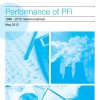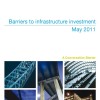This paper is the first of a new series of infrastructure financing papers from ACE. It looks at 15 years of Private Finance Initiative experience in the UK. The paper establishes the lessons learnt, both positive and negative, that must inform new thinking on project financing if the public and private sectors, and most importantly the taxpayer, is to get the best possible value for money earnings and policy.
Key findings:
- Reviewing the PFI model
PFI’s lack of public trust demonstrates that there needs to be a clear and transparent link between capital liabilities, operational liabilities and the expected rates of return for private companies within financing public projects. - Within the review of the PFI procurement model Government must look to retain the benefits that a successfully procured PFI project can deliver as it develops new financing models.
- The focus of the debate must be to develop a successful public-private model moving forward, ensuring efficient investment in the UK’s long term economic growth.
- The effect of the recession and financial crisis:
The financial crisis and recession have had a significant effect on the financial sector. Lending has been constrained, confidence between banks, consumers and business has been shaken. - There have been significant changes in the cost of capital; the cost of government borrowing; the difference between the two; the private sector’s ability to raise funds; and attitudes to risk. These factors call into question the assumptions within the PFI model, resulting in a weaker less sustainable case for its usage.
New issuance in a range of primary debt markets, global issuance of leveraged loans and issuance of high-yield corporate debt have all undergone a challenging year in 2011. This means it has been harder for companies to raise funding. - The financial crisis has changed attitudes to risk, with companies moving towards cash rich positions, paying off debt and re-enforcing balance sheets. This has fed through into the PFI model, with fewer companies able to take on the risks, and raise the finances required to make projects successful.
- A continuing aversion to risk will impact on the long term growth and investment potential of projects in the UK from the private sector. however, it is important to recognise that attitudes to risk are also aligned with the pricing of finance. For example, the recent decision of RWE and EON to abandon their UK nuclear build programme shows how difficult it is to raise finance given
uncertainty with regards to risks, earnings and policy.
Company website:
http://www.acenet.co.uk/






